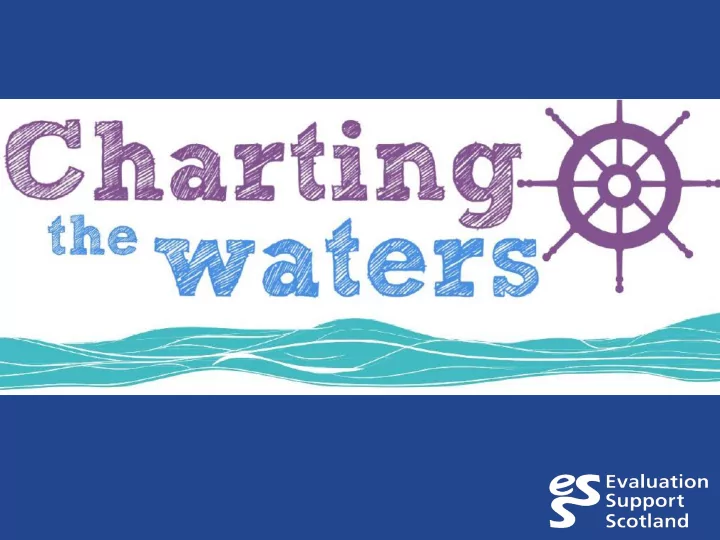

Charting the waters: evaluating your influence on policy
Evaluation Support Scotland We work with the third sector and funders so they can measure and report on their impact and use learning to improve practice and inform policy www.evaluationsupportscotland.org.uk
Policy A policy is a set of ideas or plans that is used as a basis for making decisions, especially in politics, economics, or business. Collins dictionary
Your policy influence work Think of a policy you have tried to influence? What did you do?
Policy influence approaches • Collecting evidence/ giving advice • Lobbying/ negotiation • Public campaigns and advocacy Community organisation CAB Friends Intermediary of the earth
Discussion • Why influence policy? • Why evaluate policy influence? • What’s challenging about evaluating policy influences?
Charting the waters Why policy Planning how influence is to influence important policy Explaining policy influence Challenges Case Measurement studies and framework quotes
Introduction • Why/ challenges Understanding your policy influence • Step one: set out your outcomes • Step two: understand the policy context • Step three: identify policy influence activities • Top tips/ checklist How to measure you policy influence • Select your outcome • Set your indicators • Chose your method
Influencing outcomes Relation- Awareness Attitudes / Policy Outcomes ships behaviours content for people Third Of how to Ability to Generate sector influence engage in evidence orgs policy policy Policy Of issues Better able Change Better makers and what to use policy services works evidence and voices in making policy
Evaluation One thing you will take away One thing we could have done better Ideas for further work in this area
Setting outcomes and indicators Collecting evidence Evaluation Pathway Analysing Learning and from and reporting acting on findings
Getting the language ▪ Outcomes – changes or differences that come out of your activities ▪ Activities – work you do or services you provide for your users ▪ Resources – things you need to do your work, people, finances, physical RESOURCES ➔ ACTIVITIES ➔ OUTCOMES
Writing Who is changing? outcomes What is changing? How is it changing? e.g. Young people (who) are less (how) isolated (what)
More examples ▪ Carers are better able to cope ▪ Homeowners have reduced fuel bills ▪ Learners are more able to move into employment
What would it look like if you achieved your outcomes ? Answering this will give you your indicators
Indicators Ability to suggest ideas Ability to Ability to make eye take part in contact activities Young people have increased social skills Awareness of other Ability to people’s make needs friends
Measuring outcomes Soft outcomes Increased wellbeing Reduced anxiety Coping better
Making indicators useful Indicators should: ▪ Be simple and ▪ Make sense to your specific service users ▪ Be able to be measured more than once and show change over time
If it helps, write indicators from the service user’s perspective: I am able… I feel… We can… I can…
What are your indicators? 1. Choose one of your outcomes and think of as many indicators as you can 2. Then circle 4 or 5 indicators that may be: Most important (i.e. if you saw ▪ this happening you could be very confident that your outcome is being achieved) Likely to occur in most situations ▪ Easy to measure ▪
Where do you get your evidence from? They tell you Third party Observed tells you behaviour OUTCOME EVIDENCE Internal Awards and records standards Statistics
4/5 outcomes Around • Raising awareness/ reaching people • Meeting immediate needs • Stabilising: housing, employment etc. • Softer outcomes: wellbeing/ integration/ feeling safer
Review care planning process • Review • ‘me map’ • Care plan • Change plan • Exist interview
What next?
Access free resources at: evaluationsupportscotland.org.uk Book online for our workshops:
Recommend
More recommend